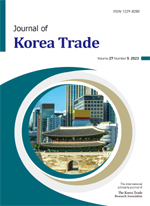학술논문
FDI and the Evolution of Directed Technological Progress Bias: New Evidence from Korean Outward Investment
이용수 14
- 영문명
- FDI and the Evolution of Directed Technological Progress Bias: New Evidence from Korean Outward Investment
- 발행기관
- 한국무역학회
- 저자명
- Boye Li Xiang Li Yaokun Wu
- 간행물 정보
- 『Journal of Korea Trade (JKT)』Vol.27 No.5, 1~22쪽, 전체 22쪽
- 주제분류
- 경제경영 > 무역학
- 파일형태
- 발행일자
- 2023.10.31
5,440원
구매일시로부터 72시간 이내에 다운로드 가능합니다.
이 학술논문 정보는 (주)교보문고와 각 발행기관 사이에 저작물 이용 계약이 체결된 것으로, 교보문고를 통해 제공되고 있습니다.

국문 초록
영문 초록
Purpose - Southeast Asia has been the focus of Korea's foreign investment. Korea has been helping developing countries in Southeast Asia achieve economic growth and win-win cooperation through capital exports. FDI is an important channel for technology diffusion. However, the impact of FDI on the bias of technological progress in the host country is dependent on the host country's own endowment structure and capital-labor factor substitution elasticity. Therefore, the central issue of this paper is to accurately evaluate the impact of Korea's FDI to the four Southeast Asian countries in various industries on their bias of technological progress.
Design/methodology - The paper uses macroeconomic data for Korea and four East Asian countries to estimate capital-labor factor elasticities of substitution using nonlinear, seemingly uncorrelated regressions (NLSUR). Then, the biased technological change index (BTCI) is calculated for each country. Finally, panel data analysis is used to explore the impact of Korean FDI in various industries in the four Southeast Asian countries on their own directed technological progress, and a robustness test is conducted.
Findings - There is a substitution relationship between capital and labor factors based on their elasticity in Korea, Singapore and the Philippines. There is a complementary relationship between capital and labor factors in Indonesia and Malaysia. According to the BTCI, there is a trend toward labor-biased technological progress in all countries. Korean investments in manufacturing, wholesale and retail trade in the host country trigger capital-biased technological change in the host country; investments in the finance, insurance and information and communication sectors trigger labor- biased technological change. In addition, this paper also confirms that directed technological progress can enable cross-country transmission.
Originality/value - The innovation of this paper lies in three aspects. First, we estimate the BTCI for five countries and explore the trend and situation of directed technological progress in each country from each country's own perspective. Second, we explore the impact of Korean FDI in the host country on the bias to its technological progress at the industry level. Second, we explore the impact of Korean FDI in various industries in the four Southeast Asian countries on the four countries' own directed technological progress from a national perspective. Finally, we propose corresponding countermea- sures for technological progress from the perspective of inverse factor endowment. These innovative points not only expand the understanding of technological progress and cross-country technology transfer in East Asia but also provide practical references for policy-makers and business operators.
목차
1. Introduction
2. Theoretical Framework
3. Empirical Strategy
4. Empirical Results
5. Conclusion
References
키워드
해당간행물 수록 논문
- Journal of Korea Trade (JKT) Vol.27 No.5 목차
- FDI and the Evolution of Directed Technological Progress Bias: New Evidence from Korean Outward Investment
- Revisiting the Role of Imported Inputs in Asian Economies
- Impact of Logistics 4.0 Technology Adoption on Logistics Performance: The Mediating Effect of Logistics Innovation Capability and the Mediated Moderation Effect of Firm Size
- The Effect of Economic and Infrastructure Factors on the Formation of Electric Vehicle Supply Chain and Optimal Location Selection: Korea-US FDI
- Legal Implications of U.S. CVD on Tires and Undervalued Currency in the WTO's SCM
- The Effect of Trade Agreements on Korea’s Bilateral Trade Volume: Mitigating the Impact of Economic Uncertainty in Trading Countries
- A Study on Co-movements and Information Spillover Effects Between the International Commodity Futures Markets and the South Korean Stock Markets: Comparison of the COVID-19 and 2008 Financial Crises
- Containing China versus Choking the Asian Economy
- Localized Knowledge Spillovers and Organizational Capabilities: Evidence from the Canadian Manufacturing Sector
참고문헌
관련논문
최근 이용한 논문
교보eBook 첫 방문을 환영 합니다!

신규가입 혜택 지급이 완료 되었습니다.
바로 사용 가능한 교보e캐시 1,000원 (유효기간 7일)
지금 바로 교보eBook의 다양한 콘텐츠를 이용해 보세요!





